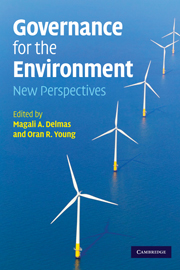Book contents
- Frontmatter
- Contents
- List of figures
- List of tables
- List of contributors
- Preface
- PART I Central threads and analytic perspectives
- PART II Governance for solving environmental problems: perspectives from economics, political science, and management
- PART III The effectiveness of governance for sustainable development
- PART IV Conclusion
- References
- Index
Preface
Published online by Cambridge University Press: 05 June 2012
- Frontmatter
- Contents
- List of figures
- List of tables
- List of contributors
- Preface
- PART I Central threads and analytic perspectives
- PART II Governance for solving environmental problems: perspectives from economics, political science, and management
- PART III The effectiveness of governance for sustainable development
- PART IV Conclusion
- References
- Index
Summary
This book is a product of our collaboration in the unique setting of the Donald Bren School of Environmental Science and Management at the University of California (Santa Barbara). Unlike mainstream, discipline based departments, which often create barriers to collaboration across the boundaries of established disciplines, the Bren School facilitates and actually encourages such collaborative efforts. So, first and foremost, we are grateful to the School for providing an academic setting conducive to our work on new developments in understanding both the nature and the role of governance in various realms.
What has made this project particularly productive for us is that new thinking about governance is developing rapidly in several different research communities that so far have had relatively little contact with one another regarding new ideas about governance. In this project, we have brought together contributors from the fields of economics, management, and political science. Lawyers also participated in the workshop on which the book is based, although none of the chapters that make up the text of the book was prepared by a lawyer.
What this effort has revealed is interesting and challenging on two counts. It is clear that there is sufficient overlap in the thinking of researchers working in these fields on the nature of governance – treated as a social function rather than a specialized organization in society – to allow for fruitful exchanges and to open up the prospect of developing a unified body of knowledge about governance.
- Type
- Chapter
- Information
- Governance for the EnvironmentNew Perspectives, pp. xi - xiiPublisher: Cambridge University PressPrint publication year: 2009

